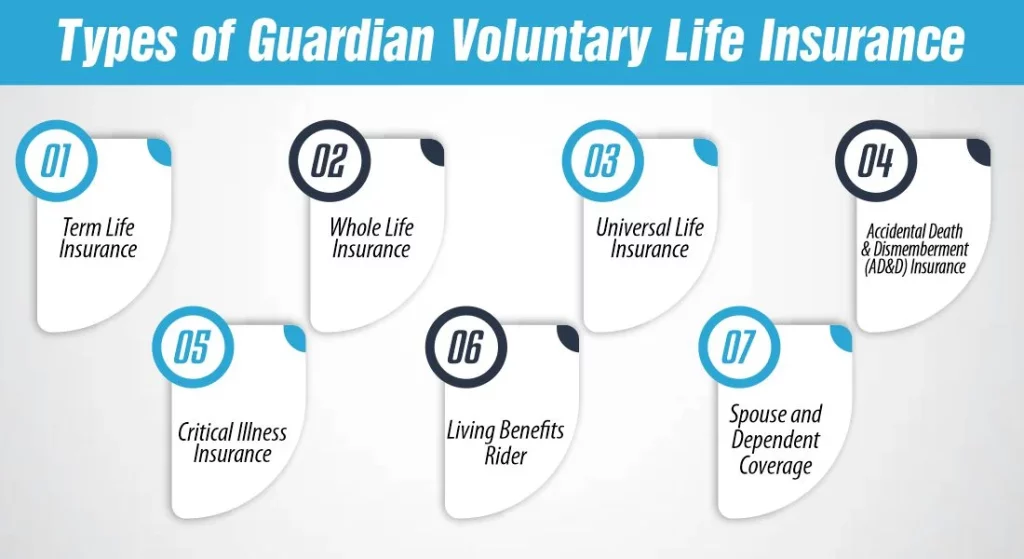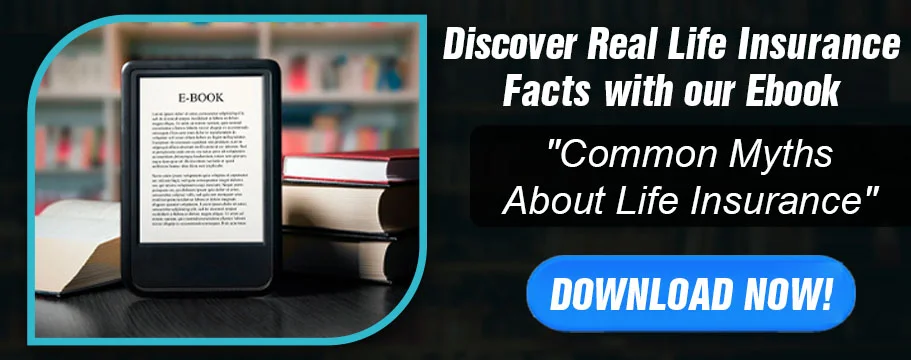In the unpredictable journey of life, safeguarding the financial future of your loved ones is paramount. One essential aspect of this protection is securing a reliable life insurance policy. Among the multitude of options available, Guardian Voluntary Life Insurance stands out as a comprehensive and flexible solution.
It is a kind of employer-provided life insurance offered to the employees if they want to choose. Mostly, employees pay the scheduled premiums to keep their plans active. But sometimes it may also come directly from the employee’s paycheck.
Want to know more about this insurance plan? Here is a blog guide for you. In this blog post, we’ll delve into the key features, advantages, and considerations that make Voluntary Life Insurance a valuable choice for individuals seeking financial security.
What is Guardian Voluntary Life Insurance?
Guardian Voluntary Life Insurance is a type of life insurance policy offered by The Guardian Life Insurance Company of America. It is designed to provide individuals with additional coverage beyond basic employer-sponsored life insurance plans. This voluntary life insurance allows policyholders to customize their coverage based on their specific needs and circumstances.
The primary purpose of Guardian Life Insurance is to offer individuals the opportunity to tailor their life insurance protection according to their unique circumstances. Whether someone is starting a family, buying a home, or planning for retirement, this type of insurance allows them to adjust their coverage to meet their evolving needs.
Key features of Guardian Voluntary Life Insurance include:
- Flexibility in Coverage: Policyholders have the flexibility to choose the coverage amount that suits their individual needs. This customization allows individuals to align their life insurance coverage with their financial responsibilities and obligations.
- Portability: Unlike employer-sponsored life insurance, Guardian Life Insurance is portable. This means that if an individual changes jobs, they can retain their life insurance coverage, avoiding disruptions in protection.
- Living Benefits: Some policies may offer living benefits, allowing policyholders to access a portion of their death benefit in the case of a qualifying terminal illness or chronic condition. This feature provides added financial flexibility during challenging times.
- Competitive Premiums: Guardian is known for offering competitive premiums on its life insurance policies, making it an attractive option for individuals seeking reliable coverage at affordable rates.
What is the Application Process for Guardian Voluntary Life Insurance?
The application process for Voluntary Life Insurance typically involves several steps. Keep in mind that specific procedures may vary, and it’s important to refer to the official documentation or contact a Guardian representative for the most accurate and up-to-date information.
Here is a general overview of the application process:
1- Enrollment Period
Individuals typically have specific enrollment periods during which they can apply for this insurance plan. These periods may coincide with open enrollment periods at the workplace or other designated times.
2- Employee Communication
Employers often communicate information about voluntary benefits, including Voluntary Life Insurance, to their employees. This communication may include details about coverage options, premiums, and the enrollment process.
3- Review Plan Options
Before applying, individuals should review the available plan options. This includes understanding the coverage amounts, premium costs, and any additional features or riders that may be offered with Voluntary Life Insurance.
4- Complete Application Form
To apply this plan, individuals typically need to complete an application form. This form gathers personal information, medical history, and other details required for underwriting purposes.
5- Underwriting Process
The insurance company, in this case, Guardian, will assess the application through an underwriting process. This involves reviewing the individual’s health history, lifestyle factors, and other relevant information to determine eligibility and calculate appropriate premiums.
6- Medical Examination (if required)
Depending on the coverage amount and individual circumstances, a medical examination may be required as part of the underwriting process. This may include a physical examination, blood tests, and other health assessments.
How Much Does Life Isurance Cost?
7- Approval and Issuance of Policy
Once the underwriting process is complete and the application is approved, Guardian will issue the policy. The policy document will outline the terms and conditions of coverage, including the coverage amount, premium payments, and any additional features.
8- Payment of Premiums
Policyholders are required to make regular premium payments to maintain coverage. The premium amounts are determined based on factors such as age, health, and the chosen coverage amount.
9- Coverage Commencement
Coverage typically begins once the policy is issued and the first premium payment is made. It’s important for individuals to understand when their coverage becomes effective and to keep track of premium payment deadlines.
It’s advisable for individuals considering Guardian Insurance to carefully read the terms and conditions of the policy, ask any questions they may have, and seek guidance from insurance professionals if needed.

Types of Guardian Voluntary Life Insurance
Voluntary Life Insurance offers various types of coverage to meet the diverse needs of individuals. The specific options available may depend on the employer’s voluntary benefits program and the choices provided by Guardian.
Here are some common types of voluntary life insurance coverage that individuals may find within Guardian’s offerings:
1- Term Life Insurance
Term life insurance provides coverage for a specified term, such as 10, 20, or 30 years. If the insured individual passes away during the term, a death benefit is paid out to the beneficiaries. Term life insurance is often more affordable compared to permanent life insurance.
2- Whole Life Insurance
Whole life insurance is a form of permanent life insurance that provides coverage for the entire lifetime of the insured individual. It includes a death benefit as well as a cash value component that grows over time. Whole life insurance offers lifetime protection and may also provide the opportunity for cash value accumulation.
3- Universal Life Insurance
Universal life insurance is another form of permanent life insurance that provides flexibility in premium payments and death benefit amounts. Policyholders can adjust their premiums and death benefits over time, making it a customizable option. Universal life insurance also includes a cash value component.
4- Accidental Death and Dismemberment (AD&D) Insurance
AD&D insurance provides coverage specifically for accidental death or severe injuries resulting in dismemberment. This type of coverage typically pays out a benefit in addition to the base life insurance benefit if the insured’s death or injury is due to a covered accident.
5- Critical Illness Insurance
Critical illness insurance may be offered as a rider or a standalone policy. It provides a lump-sum payment if the insured is diagnosed with a covered critical illness, such as cancer, heart attack, or stroke. This type of coverage can help individuals cope with the financial impact of significant health issues.
6- Living Benefits Rider
Some Voluntary Life Insurance policies may include a living benefits rider. This rider allows policyholders to access a portion of their death benefit if they are diagnosed with a terminal illness or chronic condition. It provides financial assistance during a challenging period while the insured is still alive.
7- Spouse and Dependent Coverage
Guardian Voluntary Life Insurance may offer options for coverage of spouses and dependents. This allows employees to extend life insurance protection to their family members, providing an additional layer of financial security.
Which Benefits Does Guardian Voluntary Life Insurance Offer?
Guardian Life Insurance offers a range of benefits to policyholders, providing financial security and flexibility to meet individual needs. Here are some key benefits of this insurance plan:
Customizable Coverage
One of the primary benefits of Voluntary Life Insurance is the ability to customize coverage based on individual needs. Policyholders can choose the coverage amount that aligns with their financial responsibilities, ensuring that their loved ones are adequately protected.
Portability
Guardian Voluntary Life Insurance is portable, meaning that individuals can maintain their coverage even if they change jobs. This portability ensures continuity of life insurance protection and prevents coverage gaps during transitions in employment.
Accidental Death and Dismemberment (AD&D) Coverage
Many Guardian Life Insurance policies include AD&D coverage. In case of accidental death or severe injuries resulting in dismemberment, this coverage provides an additional benefit, enhancing the scope of the policy.
Living Benefits
Some policies may offer living benefits, allowing policyholders to access a portion of their death benefit if diagnosed with a qualifying terminal illness or chronic condition. This feature provides financial support during challenging times while the insured is still alive.
Flexible Premiums
Guardian is known for offering competitive premiums on its life insurance policies. The flexibility in premium payments allows individuals to choose coverage that fits within their budget, making life insurance more accessible to a wide range of individuals.
Financial Security for Loved Ones
The primary purpose of life insurance is to provide financial security to beneficiaries in the event of the insured’s passing. Voluntary Life Insurance ensures that loved ones receive a death benefit, helping them maintain their quality of life and meet financial obligations.
What does Guardian life insurance do?
Guardian Life Insurance Company of America, commonly known as Guardian Life, is a major provider of life insurance, disability income insurance, dental insurance, and other financial products and services. Here are some of the key services and products offered by Guardian Life:
Life Insurance: Guardian offers various types of life insurance, including term life insurance, whole life insurance, universal life insurance, and variable universal life insurance. These policies provide financial protection for your loved ones in the event of your death.
Disability Income Insurance: Guardian provides disability income insurance, which replaces a portion of your income if you become disabled and are unable to work. This insurance helps you maintain your financial security and cover your expenses during a period of disability.
Dental Insurance: Guardian offers dental insurance plans that help cover the cost of preventive, basic, and major dental care. These plans can help you maintain good oral health and manage your dental expenses.
Employee Benefits: Guardian provides employee benefits solutions for businesses, including dental insurance, vision insurance, disability insurance, and life insurance. These benefits help businesses attract and retain employees and provide financial protection for their employees and their families.
Financial Services: In addition to insurance products, Guardian offers a range of financial services, including retirement planning, investment management, and wealth management services. These services help individuals and businesses plan for their financial future and achieve their financial goals.
Overall, Guardian Life Insurance Company of America offers a wide range of insurance and financial products and services to help individuals, families, and businesses protect their financial security and plan for the future.
Who owns Guardian Life?
Guardian Life Insurance Company of America is a mutual insurance company, which means it is owned by its policyholders rather than by shareholders. As a mutual company, Guardian Life does not have stock traded on public exchanges. Instead, policyholders are considered members and are entitled to vote on company matters, such as the election of the board of directors.
Since Guardian Life is a mutual company, it is not owned by any individual or group of shareholders. Instead, it is operated for the benefit of its policyholders, with any profits typically being used to improve policyholder benefits, reduce premiums, or strengthen the company’s financial position.
How do I cancel my Guardian life insurance policy?
To cancel your Guardian life insurance policy, you typically need to follow these steps:
Contact Guardian: Call Guardian Life Insurance Company’s customer service department to inform them of your decision to cancel your policy. You may need to provide your policy number and other identifying information.
Request a Cancellation Form: Ask the customer service representative to send you a cancellation form or provide instructions on how to obtain one. This form is usually required to officially cancel your policy.
Fill Out the Form: Complete the cancellation form, providing all requested information, including your policy number, name, address, and reason for cancellation.
Submit the Form: Return the completed cancellation form to Guardian Life Insurance Company. You may need to send it by mail or fax, depending on the company’s requirements.
Follow Up: After submitting the cancellation form, follow up with Guardian to ensure that your policy has been canceled and that you will no longer be billed for premiums.
It’s important to review your policy documents and contact Guardian Life Insurance Company directly for specific instructions on how to cancel your policy, as the process may vary depending on the type of policy you have and your state’s regulations.
How to use life insurance while alive?
While life insurance is typically designed to provide a financial benefit to your beneficiaries after you pass away, there are some ways you can use your life insurance while you are still alive. Here are a few options:
Cash Value Withdrawals: If you have a permanent life insurance policy such as whole life or universal life, your policy may accumulate cash value over time. You can withdraw or borrow against this cash value while you are alive. Keep in mind that any outstanding loans against the policy will reduce the death benefit paid to your beneficiaries.
Policy Surrender: You can surrender your life insurance policy in exchange for its cash value. This terminates the policy, and you receive the cash surrender value, which may be subject to surrender charges and taxes.
Accelerated Death Benefit: Some life insurance policies offer an accelerated death benefit rider, which allows you to receive a portion of the death benefit if you are diagnosed with a terminal illness or a specified critical illness. This can help cover medical expenses and other costs while you are alive.
Life Settlement: In some cases, you may be able to sell your life insurance policy to a third party in a life settlement transaction. The buyer pays you a lump sum, and they become the new beneficiary of the policy, receiving the death benefit when you pass away.
Conversion Options: If you have a convertible term life insurance policy, you may have the option to convert it to a permanent policy without the need for a medical exam. This can provide you with permanent coverage and potential cash value accumulation.
It’s essential to review your policy documents and speak with your insurance agent or financial advisor to understand the options available to you and the potential implications of using your life insurance while you are alive.
The Bottom Line
Guardian Voluntary Life Insurance stands as a robust solution for individuals seeking personalized and reliable life insurance coverage. Its flexibility, portability, and array of features make it a compelling choice for those looking to safeguard their loved ones’ financial future.

Expert Life Insurance Agent and health insurance agent
Dylan is your go-to guy for life and health insurance at InsureGuardian. He’s helped over 2,500 clients just like you figure out the best insurance plans for their needs. Before joining us, Dylan was sharing his expertise on TV with Global News and making a difference with various charities focused on health. He’s not just about selling insurance; he’s passionate about making sure you’re covered for whatever life throws your way.






